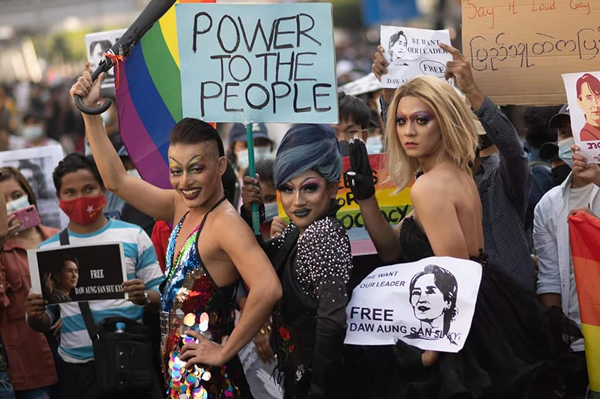Hundreds of thousands of people have taken to the streets in Myanmar since the military seized power in a coup on February 1. Workers and protesters have not been deterred, even as six people have died at the hands of repressive forces. Among those demonstrating are members of the Burmese LGBTQ community who hope that protests and mobilizations will increase acceptance in a country where discrimination remains common.
Saw Zin Maung Soe, LGBTQ activist and founder of the civil rights organization CAN Myanmar, said, “We are worried that we might be targeted by the police forces and those who are against the protests.” He was part of an LGBTQ demonstration on February 8 in the city of Mandalay that was repressed by police with fire hoses and rubber bullets. “We are all coming to the protests to support the greater cause,” he added.
Min Khant, a 21-year-old drag queen from Yangon, and his friends participated in the protests in full drag, receiving a lot of attention and support from fellow demonstrators. “People at the marches tell us we should have our rights,” he said. He hopes that LGBTQ presence in the mobilizations will help “people around the world to know about the LGBT community’s contributions for the fight for democracy.”
You might be interested in: In Myanmar, Workers Are On the Front Lines of the Fight Against the Military Coup
While persecution has escalated with the coup, anti-LGBTQ legislation was in force under the previous government of Aung San Suu Kyi. According to the International Lesbian and Gay Association’s 2020 State-Sponsored Homophobia report, Article 377 of Myanmar’s 1861 penal code prohibits sodomy — “carnal intercourse against nature” — and imposes fines and up to 10 years imprisonment.
The LGBTQ community, especially transgender people, are also targeted under Section 35c of the Police Act, also known was the “Shadow Law,” which allows authorities to arrest anyone acting suspiciously after sunset. Transwomen in particular routinely face abuse and harassment from police officers who are seldom brought to justice.
But LGBTQ protesters’ participation in the mobilizations against the coup does not mean that they are uncritically supportive of Aung San Suu Kyi and her party, the National League for Democracy (NLD). “The issue of LGBT rights was never a priority, even for the civilian government,” explained Maung Soe.
The military junta’s repression and persecution, which has included temporary cuts to cell phone and Internet connections, has not deterred the protesters. Monday saw the biggest day of protests to date, including a general strike. “LGBT are protesting in their heels and waving rainbow flags across Myanmar,” Min Khant said.
Join Left Voice for a Black History Month round table on Saturday, February 27. Sign up or view the event on Facebook.
Also at the forefront of protests are the youth and women workers, many of them from the most precarious sectors such as textile factories. The minimum wage in Myanmar is only about $3 a day, and the country offers advantageous conditions for companies looking to exploit precarious employees.
This is the framework in which solidarity has been forged between the different sectors against the military. LGBTQ activists released a letter calling to support workers who carry out the protests: “Since we, LGBTI people, have a history of active participation in past political activism, we want to announce that in this military coup, we will stand with the people and the government employees who are starting the civil disobedience campaigns.”
First published in Spanish on February 24 in La Izquierda Diario.
Translated by Otto Fors










